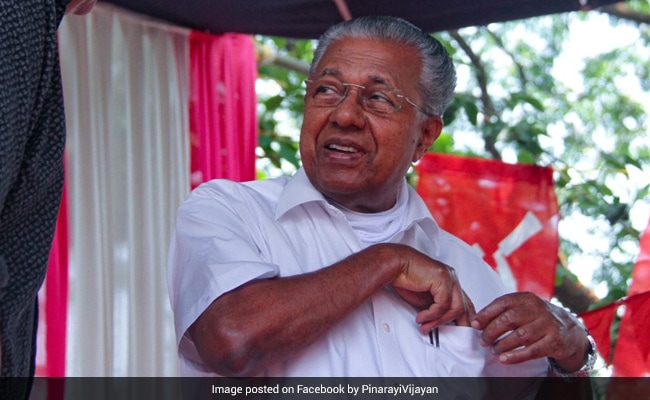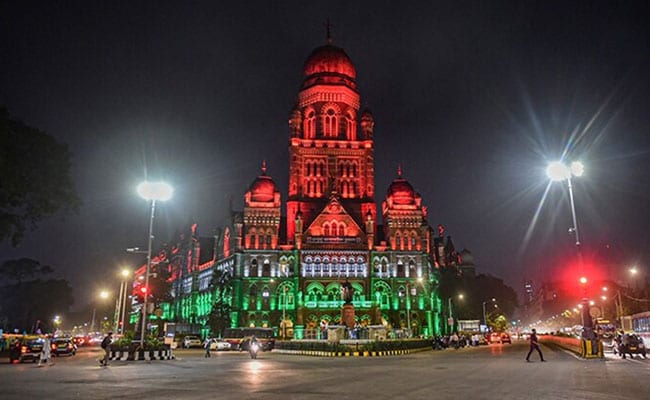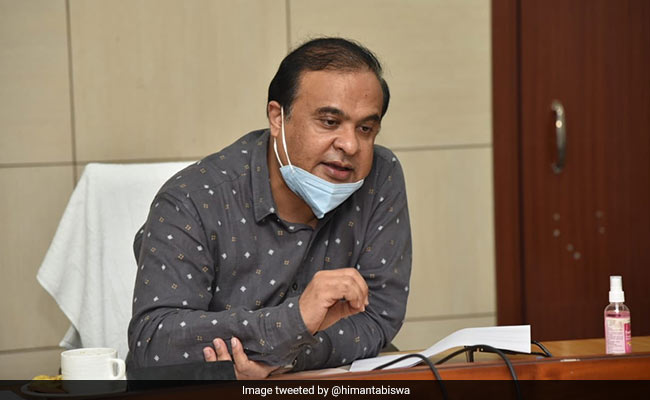Dr Anthony Fauci, the medical advisor to the United States President, said today that extending intervals between vaccine doses could leave people vulnerable to infection by one of the Covid variants in circulation.
Dr Fauci was responding to a question about recommended intervals in the light of revised guidelines by the Indian government last month.
"The ideal interval between doses for mRNA vaccines is three weeks for the Pfizer and four for the Moderna. The problem with extending intervals is that you become vulnerable to variants," he said.
Earlier in the day, the health ministry said that India reported 91,702 new COVID-19 cases and 3,403 deaths. The country has so far reported 2,92,74,823 cases of coronavirus and 3,63,079 deaths.
India's test positivity rate is on the decline. It stood at 4.48 per cent, below the 5 per cent-mark for the fourth straight day.
The active cases in the country reduced to 11,21,671 after 61 days comprising 3.83 per cent of the total infections, while the national Covid recovery rate has improved to 94.93 per cent, the data said.
Here are the Live updates on coronavirus (COVID-19) cases:
 Covid Vaccine Access Needed Thoughout World: European Medicines Agency
Covid Vaccine Access Needed Thoughout World: European Medicines AgencyThe head of the European Medicines Agency told AFP on Friday that all countries must have access to coronavirus vaccines, as G7 leaders were expected to pledge to donate one billion doses to poor nations.
 Tamil Nadu Lockdown Now Till June 21, Separate Relaxations For Hotspots
Tamil Nadu Lockdown Now Till June 21, Separate Relaxations For HotspotsAmid a decline in daily Covid case counts, the Tamil Nadu government today extended the lockdown in the state by a week, till June 21, but eased the restrictions in place.
Northern Coalfields Limited (NCL) has given Rs 10 crore to Madhya Pradesh to set up five oxygen plants in different medical colleges across the state under its Corporate Social Responsibility to assist the state in strengthening its fight against coronavirus, reported news agency ANI.
Chairman and Managing Director of NCL Prabhat Kumar Sinha handed over a cheque of the said amount to Chief Minister Shivraj Singh Chouhan on Friday.
 Kerala's 100-Day Action Plan To Tide Over Covid-Induced Economic Slowdown
Kerala's 100-Day Action Plan To Tide Over Covid-Induced Economic SlowdownKerala Chief Minister Pinarayi Vijayan Friday announced a 100-day action plan to help the state tide over the economic slowdown triggered by the devastating second wave of the coronavirus pandemic.
 Mumbai To Remain Under Level 3 Covid Curbs Despite Fall In Positivity Rate
Mumbai To Remain Under Level 3 Covid Curbs Despite Fall In Positivity RateMumbai will continue to remain in the level-3 category of the Maharashtra government's plan to ease the coronavirus-induced restrictions in the state till further orders, the Brihanmumbai Municipal Corporation (BMC) said Friday night.
 No Vaccination Drive In Maharashtra's Thane Today, Tomorrow Over Heavy Rain Forecast
No Vaccination Drive In Maharashtra's Thane Today, Tomorrow Over Heavy Rain ForecastAll civic corporations in Maharashtra's Thane district late Friday evening said vaccination drive will remain suspended on Saturday and Sunday in view of weather office's forecast of heavy rain.
COVID-19 vaccination in Bihar is likely to pick up with Chief Minister Nitish Kumar on Friday setting a target of inoculating 60 million people in the next six months.
The chief minister gave instructions to the effect at a meeting of the state health department .
Till date, 1.18 crore people in the state, which has a total population of about 13 crores, have received the jabs.
The chief minister said to achieve the target of "vaccinating six crore people in six months", as many government employees as required should be roped in.
British Prime Minister Boris Johnson on Friday hailed the first in-person G7 summit in nearly two years as a "huge opportunity" to kickstart recovery from the coronavirus pandemic.
Opening the first session of the leaders' meeting in Cornwall in southwest England, the summit host said a more equitable future for the world was essential.
Former Himachal Pradesh chief minister Virbhadra Singh has tested positive for COVID-19 for the second time in two months, a health official said on Friday. The veteran Congress leader had earlier tested positive for the disease on April 12.
He is being treated at Indira Gandhi Medical College (IGMC) hospital, Shimla and his condition is stable, Special Secretary (Health) Nipun Jindal said.
Nine-time MLA and five-time MP, Singh was Himachal Pradesh's chief minister for six terms.
The Madhya Pradesh government told the High Court on Friday that 204 ventilators - life-saving medical equipment in desperately short supply during the peak of the second Covid wave - were kept as "back-up" in a storeroom even as the virus spread through the state.
It was responding to a notice from the High Court, which had taken suo motu cognisance of the Covid situation in Madhya Pradesh, which has recorded nearly eight lakh cases so far.
"204 ventilators were kept in the storeroom, which the government said was kept as backup. 42 ventilators under PM CARES are in Bhopal and 20 in Indore, which were not used in the second wave of coronavirus," senior lawyer Naman Nagrath, the court's amicus curiae, said. Read
Maharashtra Deputy Chief Minister Ajit Pawar on Friday said the administration in Pune will consider introducing some relaxations if the COVID-19 positivity rate in the city continues to be below 5 per cent in the next two days.
Last week, Pune city had come under the state government's level 3 category. However, with the positivity rate dropping a little below 5 per cent, the city has now moved to level 2.
Under relaxations in level 2, shops are permitted to operate till 7 pm, while hotels, restaurants, and eateries can function till 10 pm for dine-in with 50 per cent seating capacity and malls can operate by adhering to social-distancing norms.
The positivity rate also saw a significant decline and stood at 0.31%, the lowest in over three months (after March 7).
The recovery rate and the death rate stand at 97.99 per cent and 1.73 per cent, respectively.
As many as 504 patients have recovered in the past 24 hours, taking the number of total discharged patients in the city to 14,01,977.
Today's cases in Delhi were 67 less compared to yesterday - when it recorded 305 cases, with 44 fatalities.
Delhi, which had imposed lockdown-like restrictions in April, began the process of unlocking on Monday.
Extending the interval between Covid vaccine doses could leave people vulnerable to infection by one of the many variants of the virus currently in circulation, Dr Anthony Fauci, the medical advisor to the President of the United States, told NDTV Friday.
Top Covid expert Dr Fauci was responding to a question about recommended intervals between vaccine doses in the light of revised guidelines by the Indian government last month.
"The ideal interval between doses for the mRNA vaccines is three weeks for the Pfizer and four weeks for the Moderna. The problem with extending intervals is that in-between doses you become vulnerable to variants," Dr Fauci told NDTV.
The British government said Friday that the new Delta coronavirus variant is 60 percent more transmissible in households than the variant that forced the country to lock down in January.
The Delta variant, which first emerged in India, has caused a rise in cases in the UK, prompting questions about whether social distancing restrictions will be lifted as planned from June 21.
New research from Public Health England "suggests that the Delta variant is associated with an approximately 60 percent increased risk of household transmission" compared to the Alpha variant identified in Kent, southeast England.
The Kent variant caused a surge of Covid cases in January leading to a three-month lockdown as hospitals were stretched to near-capacity.
The government on Friday said it is "proactively trying to curb wastage of COVID-19 vaccines" and that it is "guiding" states and UTs in "effectively using doses to fight the pandemic".
It also hit back at "media reports stating the Ministry of Health's insistence in keeping vaccine wastage below one per cent is unrealistic and undesirable".
The statement comes a day after a report said Jharkhand wasted 33.95 per cent of doses in May. Chhattisgarh, the report said, wasted 15.79 per cent and Madhya Pradesh around seven per cent.
A day later the Hemant Soren government in Jharkhand hit back, calling the central government's data "old" and insisting that its wastage rate was just 1.5 per cent. Read
Door to door vaccination in district #samba. Dedication of health and medical teams helping in saturation of #COVID19Vaccination @diprjk pic.twitter.com/cDrOQ9l4WT
- Deputy Commissioner Samba (@dcofficesamba) June 11, 2021

#Kerala providing doorstep Covid #vaccination for bedridden patients. NDTV's Sneha Mary Koshy reports
- NDTV (@ndtv) June 11, 2021
Read here: https://t.co/Pux7HHWhMV pic.twitter.com/NexXSwYK5K
6-Minute Walk Test, No Remdesivir: Guidelines For #Covid Management In Children https://t.co/IVfoyDDDWM pic.twitter.com/bMpPk1Km4t
- NDTV (@ndtv) June 11, 2021

 Tamil Nadu Among States With Low Vaccination Rate, 9% Given First Dose
Tamil Nadu Among States With Low Vaccination Rate, 9% Given First DoseDespite a robust health care system, Tamil Nadu has fallen behind in the vaccine race and is among the bottom five states in terms of vaccinating its population against coronavirus. Only 9% of its population has been administered the first dose.
 Assam Launches Welfare Schemes For Covid Orphans, Widows
Assam Launches Welfare Schemes For Covid Orphans, WidowsAssam on Thursday introduced welfare schemes for children orphaned by Covid and those who have lost their spouses to the virus. Announcing the two major Covid welfare schemes, Chief Minister Himanta Biswa Sarma said he aims to inoculate the entire state by August 15 with at least the first dose of the vaccine.


